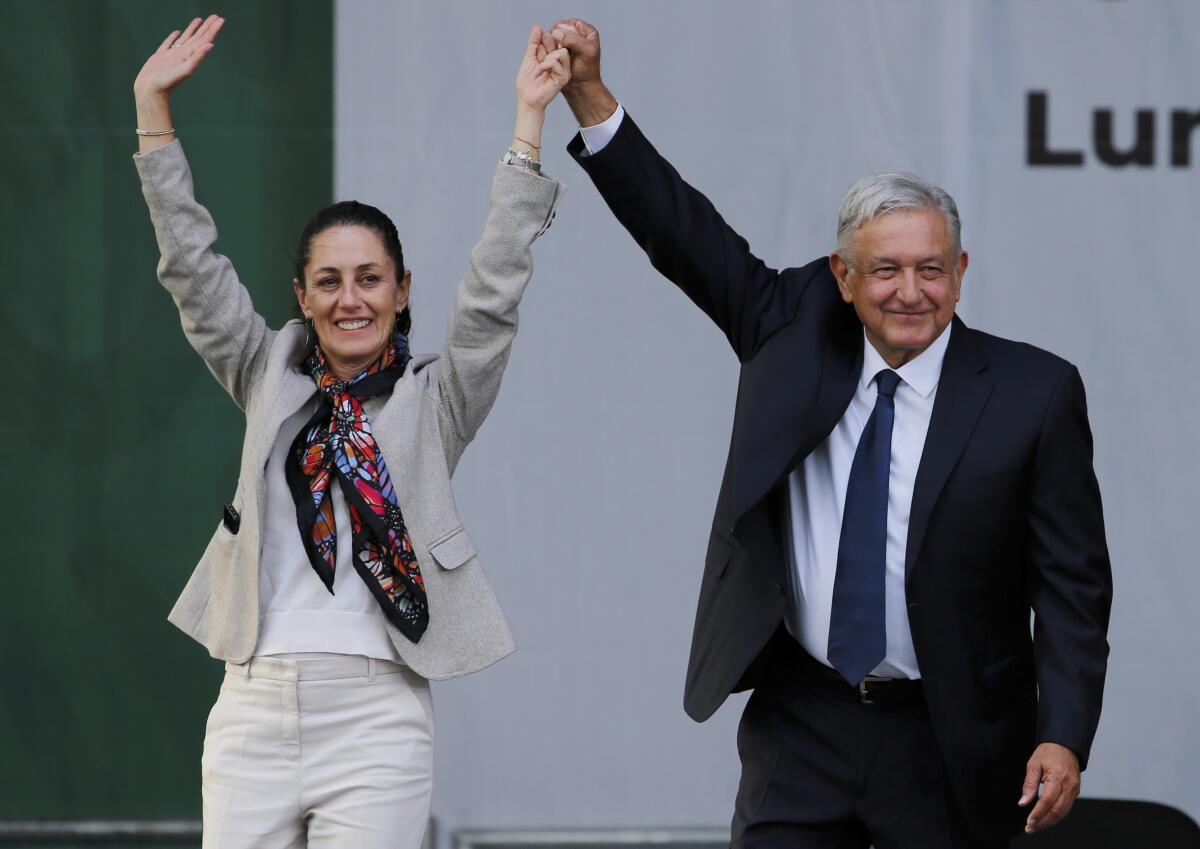Mexican politicians spar over the ‘Claudia Card’

- Share via
Mexico’s next presidential election is still more than two and a half years away, but one potential candidate — the high-profile mayor of Mexico City — is already being accused of cheating.
The controversy began last month when the Mexico City government unveiled new “scholarship” cards that provide 1.2 million preschool, elementary and high school students up to $24 a month for meals and other supplies.
The cards have been around since Mayor Claudia Sheinbaum presented them in 2019. Her opponents aren’t happy that her government has been promoting them by holding assemblies with parents that are heavily focused on paying homage to her.
What set them off was a speech from a top federal education official at one of those events. After praising the mayor as a champion of children, he told parents that teachers had been calling it the “Claudia Card.”
Opposition parties filed complaints with two electoral oversight institutions, accusing the mayor of illegally using public funds for self-promotion — a long tradition in Mexico despite attempts to root it out.
There are “electoral rules that establish equal footing for all candidates,” and “the moment Claudia Sheinbaum campaigns three years early, she is breaking that equality,” said Ángel Ávila, who represents the Party of the Democratic Revolution before the National Electoral Institute.
Kenia López Rabadán, a senator with the National Action Party, held a news conference to say that it would only be fair to also “put Claudia’s name on everything that this government doesn’t do well.”
“We should talk about ... the homicides of Claudia’s government, the disappeared of Claudia’s government, the femicides of Claudia’s government,” she said.
Sheinbaum has denied the accusations, telling local media that the only thing she’s endorsing is the right to an education and that “it’s not about exchanging support for a vote.”
Her chief of staff, José Alfonso Suárez del Real y Aguilera, told The Times that the mayor has not expressed any desire to run for president and that the head of the Federal Education Authority in Mexico City had a momentary “lapse” when he used the words “Claudia Card.”
What truly bothers critics, he said, is “the fact that we make the right to an education universal and free in our public school system.”
Election authorities said they didn’t have jurisdiction to review the issue and have been referring the complaints to auditing agencies.
“We didn’t find that it would affect an election because we don’t have an election,” said Bernardo Valle Monroy, a senior official at the Electoral Institute of Mexico City. “We are very far from election time.”
Political candidates in Mexico have long been accused of everything from handing out gift cards to wooing voters with cheaper tortillas.
Operatives of the Institutional Revolutionary Party, which governed Mexico for seven decades, would arrive at poor communities to install power lines just before elections.
Vidal Romero, a political scientist at ITAM university in Mexico City, said handouts of cash cards are an “instrument of propaganda” that help citizens see how resources are transferred to them and give them a clearer idea of how to vote.
As for the cash cards for students, experts said the way they have been promoted is ethically troubling at the least.
“There’s a super fine line between a government exercising its resources and using social programs for personal gain,” said Beatriz Camacho, an analyst for the Civic Alliance, an electoral watchdog group in Mexico. “On the one hand, Claudia can say it’s social policy to give money to these kids, and she’s right, and on the other hand, until what point is calling it ‘the Claudia Card’ strengthening her image in the long run?”
The Mexico City press has noted that the latest version of the card is white and cherry red, close enough to the colors of the mayor’s political party, Morena.
As for whether any laws were broken, Horacio Vives, a former advisor at the National Electoral Institute, said that because Sheinbaum’s name is not on the card, it’s “a border situation.”
Luis Carlos Ugalde, a former president of the Federal Electoral Institute, said that Sheinbaum should denounce the education official’s statement.
“I think there’s no doubt that it’s a strategy to benefit her politically,” he said.
Sheinbaum, who has a doctorate in energy engineering, became the city’s first elected female mayor in 2018. Among her accomplishments has been expanding Wi-Fi access throughout the city, which recently established a world record for the most free hot spots in an urban network.
But her recent tenure has been dominated by the pandemic and the collapse of a metro overpass in May that killed more than two dozen people.
A prot´egé of President Andrés Manuel López Obrador, she is already considered a front-runner in the 2024 presidential race. She recently attended the inaugurations of female governors in Baja California, Guerrero and Colima states, which some political observers saw as an attempt to boost her national profile.
The “scholarship” cards, which can be used at various stores across the city, have been popular with parents. The controversy over Sheinbaum hasn’t changed that.
“The honest truth is that it doesn’t bother me, but in this city people misinterpret everything,” said Carlos Rodriguez, an Uber driver whose 9-year-old son already received the new card. “I know that this card doesn’t come from her personally.”
More to Read
Sign up for Essential California
The most important California stories and recommendations in your inbox every morning.
You may occasionally receive promotional content from the Los Angeles Times.











